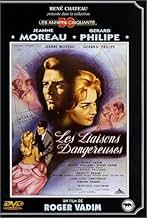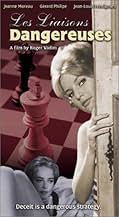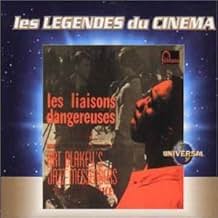Les liaisons dangereuses
- 1959
- 1h 51m
Juliette Merteuil and Valmont is a sophisticated couple, always looking for fun and excitement. Both have sexual affairs with others and share their experiences with one another. But there i... Read allJuliette Merteuil and Valmont is a sophisticated couple, always looking for fun and excitement. Both have sexual affairs with others and share their experiences with one another. But there is one rule: never fall in love. But this time Valmont falls madly in love with a girl he m... Read allJuliette Merteuil and Valmont is a sophisticated couple, always looking for fun and excitement. Both have sexual affairs with others and share their experiences with one another. But there is one rule: never fall in love. But this time Valmont falls madly in love with a girl he meets at a ski resort, Marianne.
- Marianne Tourvel
- (as Annette Vadim)
- Petit rôle
- (uncredited)
- Un invité des Valmont
- (uncredited)
- Un inspecteur
- (uncredited)
- Un invité des Valmont
- (uncredited)
Featured reviews
A book that has been filmed many times, this early Vadim version is not only one of his best movies. He manages to reduce the bitching to a grand dramatic flourish, not a raison d'etre. Unsurprisingly. He was known off-screen for his sensual and avant-garde lifestyle. On-screen he can portray sensuality with realism and accuracy. (Even if the nudity is tame by today's standards.) Unlike most leads, Valmont doesn't just make girls swoon by appearing in frame. He tells them what they want to hear. If it weren't for the moralistic ending deemed necessary by popular culture, the movie could be a handbook of seduction. For the script has a feeling of authenticity.
Vadim has been described as the "classiest exploitation filmmaker who ever lived." Bardot, one of his five wives, called him, 'seduction itself.' (Of the men she married after him, she said dismissively, "They were only husbands.") The skill with which Valmont and Juliette entrance even gorgeous young ingénues is masterful. If all lovers possessed such consummate ability, might the world be a happier and less frustrating place? But, inevitably, our pair not only misuse their technique, failing to put the good of their conquests uppermost, but fall into the one trap they thought they could always avoid . . .
Cinematography in Dangerous Liaisons is straightforward cinema at its finest. The vicarious pleasure of boldly careering down the Alps almost made me want to take up skiing too. Simple use of black and white photography is mirrored in the appealing, clear-cut personas that Valmont projects. He lies in the snow, confidently dressed in black, with the virtuous Marianne all in white nest to him. Simple shots. Valmont on a train station - silhouetted against the steam. Figures on an empty beach plus a few horses. Such composition is breathtaking. Especially with the high-keyed psychological tension that runs through. And when someone gets a sock to the jaw, it sounds real, not like it usually does 'in the movies'.
Temptation to go beyond the bounds of their seducers' art has a number of dramatic purposes. It provides a great theatrical crescendo. It gives a nod to the original book. And it 'keeps the peace' with the morality of monogamy. As Valmont's hedonism leaves its own well-defined limits, he shouts over the jazz, like a soloist insisting on ill-timed attention.
The didactic attitudes to pleasure of the day are one of the reasons that Vadim's original Dangerous Liaisons works better than in more modern interpretations. Today's woman (and man) likes to make independent choices, as well as be wooed intelligently. The careful plotting of Vadim's philanderers is more evil in a time when 'goodness' is equated with sexual ignorance Juliette and Valmont are 'clear-headed' rather than 'jealous' of each other's affairs. They have been together eleven years. Does no-one observe that this is a longer innings (by their own admission) than any of their more conservative friends? Instead of the Machiavellian rendering of the protagonists in other versions, Juliette and Valmont are ultra-chic. And, until they come off the rails, ultra-desirable.
Dangerous Liaisons is the movie that brought Jeanne Moreau (Juliette) to an international audience. Her full-on pout projects an aura of sexuality (compare her here with her performance in films such as Lumiere and L'Adolescent to see what a consummate act it is). She conquers us by identifying her 'amoral' lifestyle with a moral high ground (and one which indeed persists longer and more convincingly than that of her husband). When she refuses to sleep with him early on in the movie, she explains that she is never 'unfaithful' to her lovers. She shares the details of her current suitor with him intellectually rather than physically. And she is the first to be appalled at the human wreckage that Valmont's unconscious search for emotional truth is leaving in its wake.
We maybe tend to think of French New Wave films as being terribly provocative. Yet they could only be provocative within the bounds of the strong French censorship of the time. Films about Indochina and Algeria were halted. Dangerous Liaisons was briefly suppressed for painting an unflattering portrait of French diplomats. The Centre National de la Cinématographie strengthened its power over controversial scripts after its release. But the New Wave 'rebelliousness' associated with the influential Cahiers du Cinema group of directors like Godard and Truffaut was initially that of that of the 'youth class'. It was in relation to Vadim's work that the term was first coined.
Even sophistication has its limits. And this film dashes the intellectualism of high art on its head before bringing us to its gratuitously high moral conclusion.
First of all those movie had one Great Actress in Jeanne Moreau. Bur ir as an incompetent Director in Roger VAdim and some miscasts like Gérard Philippe as Valmont. Perhaps the main culprit is "Roger Vailland". I'm am very fond of "Vailland",love is novels (namely "Drôle de Jeu", but I've read them when I was too young. Nowadays I believe that is is the wrong kind of scriptwriter. Also Roger Vadim did not care for literature. Ask Brigite Bardot. This is a semi-failure. See it only id you are a fan of Jeanne Moreau. There is more eroticism in "Journal d'une Femme de Chambre" by Luis Buñuel than here, about "boudain". "morcilla" or just plain English "sausage". The Anglo-Saxons cannot make sausages and the current laws forbid to to it properly..
Incidentally, in view of the updating of the narrative from the 18th to the 20th century, the full original title is LES LIAISONS DANGEREUSES 1960; tragically, co-star Gerard Philipe would not live to see that year through, as he succumbed to cancer two months after the film's September release though he had, by then, finished work on another, namely Luis Bunuel's REPUBLIC OF SIN (1959). The source novel has been regularly adapted for both the big and small screens, especially in the last 25 years: I had earlier watched the 1988 DANGEROUS LIAISONS and the 1999 modernization CRUEL INTENTIONS, and also own the 1989 VALMONT and the 2003 DANGEROUS LIAISONS TV mini-series (coincidentally, featuring one of Vadim's former flames and VICE AND VIRTUE co-star Catherine Deneuve); speaking of Philipe, Vadim and remakes, it is interesting to note that Philipe had appeared in the original versions of two films Vadim would eventually rework, i.e. LA RONDE (1950) and THE SEVEN DEADLY SINS (1952; Vadim's would be made 10 years later where, again, he was just one of several directors involved in an anthology).
Anyway, this adaptation of French sexual intrigues makes a rather uneasy stab at equating what can be described as the perversions of the nobility (taking pleasure in corrupting the inexperienced, consequently quashing their idealized notion of love) with the amoral attitudes of the late 1950s; I say uneasy because, even if Federico Fellini's contemporaneous LA DOLCE VITA depicted a similarly decaying aristocracy, the 1960s would soon reveal that hedonism was pervasive and not tied to a certain class! That said, the plot retains its essential fascination – aided by the spot-on casting of Philippe, Jeanne Moreau (who would break out internationally soon after), Annette Stroyberg (then Vadim's wife and billed under his surname), Jeanne Valerie and Jean-Louis Trintignant; in keeping with the director's penchant for nudity, all three females mentioned shed their clothes throughout – but these scenes are extremely tame by the standards of even a decade down the line!
There are other good and not-so-good points: on the one hand, the ironic come-uppance of the central conniving pair (Philippe is killed in a fall while struggling with the otherwise mild-mannered Trintignant, after the latter finds out that the former has impregnated his girlfriend – and Philipe's own cousin! – Valerie; Moreau – Philipe's wife, who had also callously tried to break up the young couple's affair by seducing Trintignant – is facially-scarred after being engulfed in flames while trying to dispose of incriminating letters prior to the impending inquest over her husband's death); and the jazz soundtrack by Thelonious Monk (a trend popularized by Miles Davis' score for Louis Malle's LIFT TO THE SCAFFOLD {1958}, also featuring Moreau). On the other hand, some of the dancing at the climactic party is 'wildly' dated but, more importantly, Stroyberg's descent into madness at Philipe's deception simply does not ring true in a modern context! For what it is worth, the film is also included in the "Wonders In The Dark" poll and I watched it appositely to mark the birthdays of its director and main female star.
Objections to this early version -to be followed by half a dozen of them- remain:that the story should have been transferred to the sixties is eminently questionable:La Merteuil was a definitely modern original character in Choderlos de Laclos's times ;in 1960,such a woman's behavior had become banal.Vadim would do worse when he would transfer Zola's "la curée" to his era.
Proof positive that all that glittered in the nouvelle vague was not gold.
Did you know
- TriviaThe film was released eight weeks before Gerard Philippe's sudden death.
- ConnectionsFeatured in L'amour dure trois ans (2011)
- How long is Dangerous Liaisons?Powered by Alexa
Details
- Runtime1 hour 51 minutes
- Color
- Aspect ratio
- 1.37 : 1
- 1.66 : 1
Contribute to this page

































